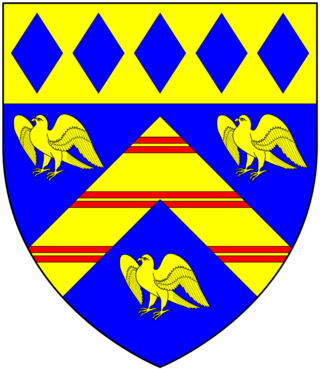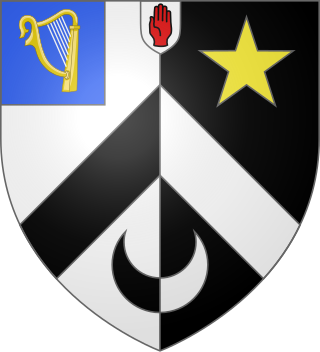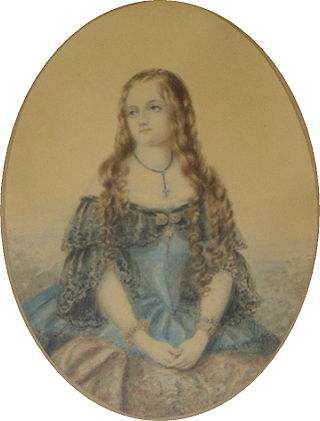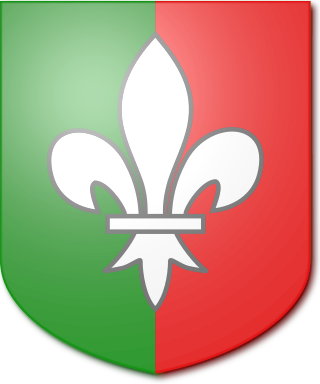
Viscount Hardinge, of Lahore and of Kings Newton in the County of Derby, is a title in the Peerage of the United Kingdom. It was created in 1846 for the soldier and Tory politician Sir Henry Hardinge. His son, the second Viscount, represented Downpatrick in Parliament. His great-great-grandson, the sixth Viscount, succeeded a distant relative as eighth Baronet, of Belle Isle in the County of Fermanagh, in 1986. This title had been created in the Baronetage of the United Kingdom 1801 for Richard Hardinge. He was the third son of Nicolas Hardinge, younger brother of Reverend Henry Hardinge and uncle of the latter's third son Henry Hardinge, 1st Viscount Hardinge. The baronetcy was created with special remainder to the heirs male of Richard Hardinge's father.

Baron Roborough, of Maristow in the County of Devon, is a title in the Peerage of the United Kingdom. It was created on 24 January 1938 for Sir Henry Lopes, 4th Baronet. He had earlier represented Grantham, Lincolnshire, in Parliament as a Conservative. The Baronetcy, of Maristow House in the County of Devon, had been created in the Baronetage of the United Kingdom on 1 November 1805 for Manasseh Masseh Lopes, a member of a wealthy family of Portuguese Jewish origin, with special remainder to his nephew Ralph Franco, son of his sister Maria. Manasseh Masseh Lopes converted to Christianity in 1802, and later represented Evesham, in Worcestershire, Barnstaple in Devon, and Westbury in Somerset, in Parliament. However, in 1819 he was twice convicted of bribing the voters in both Barnstaple and Grampound in order to be elected to Parliament, and was sentenced to imprisonment and heavy fines. He was also unseated by the House of Commons, but after his release from prison he nonetheless got elected for Westbury, a pocket borough which he controlled to a great extent.
The Adair Baronetcy, of Flixton Hall in the County of Suffolk, was a title in the Baronetage of the United Kingdom. It was created on 2 August 1838 for Robert Adair. He was succeeded by his eldest son, the second Baronet. He sat as Member of Parliament for Cambridge. In 1873 he was created Baron Waveney, of South Elmham in the County of Suffolk, in the Peerage of the United Kingdom. The barony became extinct on his death in 1886 while he was succeeded in the baronetcy by his younger brother, Hugh Adair, the third Baronet. The latter had earlier represented Ipswich in Parliament. Two of his sons, the fourth and fifth Baronets, both succeeded in the title. The fifth Baronet's son, the sixth Baronet, was a major general in the British Army. The title became extinct on the latter's death in 1988.

The Alexander, later Cable-Alexander Baronetcy, of the City of Dublin, is a title in the Baronetage of the United Kingdom. It was created on 11 December 1809 for William Alexander, Lord Mayor of Dublin. The second Baronet was a Director of the Bank of Ireland. The third Baronet was Attorney-General to Albert Edward, Prince of Wales, later Edward VII. The seventh Baronet assumed in 1931 by deed poll the additional surname of Cable, being the surname of his mother, the Hon. Noorouz Weston Cable, daughter of Baron Cable. As of 31 December 2013 the present Baronet has not successfully proven his succession and is therefore not on the Official Roll of the Baronetage, with the baronetcy considered dormant.

The Ogle baronetcy, of Worthy, was a title in the Baronetage of the United Kingdom. It was created on 12 March 1816 for Admiral Chaloner Ogle, of Kings Worthy, Hampshire.

There has been one creation of a baronetcy with the surname Dering.

The Peek Baronetcy, of Rousdon in the County of Devon, is a title in the Baronetage of the United Kingdom. It was created on 13 May 1874 for Henry Peek. He was an importer of spices, tea and other groceries, a philanthropist and Conservative Member of Parliament for Surrey Mid. The second Baronet was an astronomer and meteorologist; the third Baronet was high sheriff of Devon in 1912.

The Synge Baronetcy, of Kiltrough in the County of Meath, is a title in the Baronetage of the United Kingdom. It was created on 12 August 1801 for Robert Synge. The third Baronet served as High Sheriff of County Cork in 1844. The family surname is pronounced "Sing". As of 28 February 2014 the present Baronet has not successfully proven his succession and is therefore not on the Official Roll of the Baronetage, with the baronetcy considered dormant since 2011.

The Price, later Rugge-Price Baronetcy, of Spring Grove in Richmond in the County of Surrey, is a title in the Baronetage of the United Kingdom. It was created on 2 February 1804 for Charles Price, Member of Parliament for the City of London from 1802 to 1812 and Lord Mayor of London from 1802 to 1803. The fifth Baronet assumed in 1874 by Royal licence the additional surname of Rugge. As of 28 February 2014 the present Baronet has not successfully proven his succession and is therefore not on the Official Roll of the Baronetage, with the baronetcy considered dormant since 2000.

The Wraxall Baronetcy, of Wraxall in the County of Somerset, is a title in the Baronetage of the United Kingdom. It was created on 21 December 1813 for Nathaniel Wraxall. He was in the East India Company Civil Service, an author and member of parliament for Hindon, Ludgershall and Wallingford. His grandson, the third Baronet, was an author.

The Stracey baronetcy, of Rackheath in the county of Norfolk, is a title in the baronetage of the United Kingdom. It was created on 15 December 1818 for Edward Stracey. He was the eldest surviving son of Sir John Stracey, chief judge of the Sheriff's Court and a recorder of London.

The ffolkes Baronetcy, of Hillington in the County of Norfolk, is a title in the Baronetage of Great Britain. It was created on 26 May 1774 for Martin ffolkes, FRS later High Sheriff of Norfolk and Member of Parliament for King's Lynn. The second Baronet represented Norfolk and Norfolk West in the House of Commons while the third Baronet represented King's Lynn. The fifth Baronet was Honorary Chaplain to Queen Victoria, Chaplain-in-Ordinary to Edward VII and George V and Chaplain to Edward VIII and George VI.

The Poore Baronetcy, of Rushall in the County of Wiltshire, is a dormant title in the Baronetage of Great Britain. It was created on 8 July 1795 for John Methuen Poore, with remainder, failing heirs male of his own, to his brother Edward Poore and the heirs male of his body.

The Buckworth, later Buckworth-Herne, later Buckworth-Herne-Soame Baronetcy, of Sheen in the County of Surrey, is a title in the Baronetage of England. It was created on 1 April 1697 for John Buckworth, High Sheriff of London in 1704. The second Baronet sat as Member of Parliament for Weobley. The third Baronet was Assistant Gentleman Usher to George II. The fifth Baronet was Gentleman-Pensioner and Exon of the Guard during the reign of George III. He married Anne, daughter of Paston Herne, of Haveringland Hall, Norfolk, and assumed by Royal licence the additional surname of Herne. The sixth Baronet assumed in 1806 by Royal licence the additional surname of Soame in compliance with the will of Sir Peter Soame, 4th Baronet, of Thurlow. The ninth Baronet was a member of the Shropshire County Council.

The Dalrymple-Horn-Elphinstonebaronetcy, of Horn and of Logie Elphinstone in the County of Aberdeen, is a dormant title in the Baronetage of the United Kingdom. It was created on 16 January 1828 for Robert Dalrymple-Horn-Elphinstone. He was the grandson of Hew Elphinstone, second son of Hew Dalrymple, Lord North Berwick, third son of James Dalrymple, 1st Viscount of Stair. The second Baronet sat as Member of Parliament for Portsmouth. The fifth Baronet assumed the surname of Elphinstone-Dalrymple. The title became either extinct or dormant on the death of the seventh Baronet in 1956.

The Blackwood baronetcy, of the Navy, was created in the Baronetage of the United Kingdom on 1 September 1814 for the Honourable Henry Blackwood, seventh son of Sir John Blackwood, 2nd Baronet and of Dorcas Blackwood, 1st Baroness Dufferin and Claneboye. He was a Vice-Admiral of the Blue in the Royal Navy and was the bearer of despatches announcing the victory of Trafalgar in 1805. The 7th Baronet succeeded as 10th Baron Dufferin and Claneboye and 11th Baronet of Killyleagh in 1988.
The Preston baronetcy, of Beeston St Lawrence in the County of Norfolk, was created in the Baronetage of the United Kingdom on 30 May 1815 for Thomas Hulton Preston. Born Thomas Hulton, he was the son of Henry Hulton and his wife Elizabeth, daughter of Isaac Preston of Beeston St Lawrence, whose estates he inherited. In 1804 he assumed the surname of Preston in lieu of his patronymic. He was a militia colonel in the Norfolk volunteer infantry.

The Brooke baronetcy, of Almondbury in the West Riding of the County of York, was created in the Baronetage of the United Kingdom on 13 September 1919 for John Brooke, a Director of John Brooke & Sons, of Huddersfield, and a Justice of the Peace for the West Riding of Yorkshire and Ross-shire. He was the younger brother of the 1st Baronet of the 1899 creation.

The Forbes baronetcy, of Newe in the County of Aberdeen, was created in the Baronetage of the United Kingdom on 4 November 1823 for Charles Forbes, a merchant in Bombay, India. He was a Member of Parliament for Beverley and then Malmesbury.

The Lawson, later Howard-Lawson baronetcy, of Brough Hall in the County of York, was created in the Baronetage of the United Kingdom on 8 September 1841 for William Lawson. Born William Wright, he was the son of John Wright, of Kelvedon, by Elizabeth Lawson, daughter of the 5th Baronet of the 1665 creation whose surname he assumed in lieu of his Wright. His mother had previously inherited the Lawson family seat of Brough Hall.



















